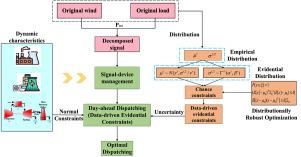Signal-devices management and data-driven evidential constraints based robust dispatch strategy of virtual power plant
IF 7.5
1区 计算机科学
Q1 COMPUTER SCIENCE, ARTIFICIAL INTELLIGENCE
引用次数: 0
Abstract
Ensuring the safety and reliability of energy systems is very important in power grid operation. However, inherent intricacies and uncertainties of modern-day power systems, such as the mismatch between signal frequency and equipment response speed and the stochasticity associated with renewable energy and load forecasts, create significant challenges for generation dispatch planning. This study proposes a robust optimization approach with constraints based on signal-devices management and data-driven evidential distribution constraints. The first stage of this approach is to decompose and recombine the net power demand according to the Hilbert-Huang transform and device capability. The signal-device management constraints are then established based on this. The second stage formulates an evidential constraint based on data-driven evidential distribution and chance constraints in a distributionally robust optimization framework that caters to the stochasticity associated with renewable energy and load forecasts. The proposed model is validated on a virtual power plant to assess the approach’s efficacy for different dispatching scenarios. Penalty-based sensitivity analysis provides further insights into the proposed method’s performance for varying levels of emissions. Simulation results demonstrate that system flexibility becomes increasingly crucial for maintaining system stability and security as the penetration of renewable energy grows. Compared with chance constraint, the proposed data-driven evidential constraint effectively enables the optimization framework to handle stochasticity after sacrificing 0.62% more economic loss and 0.7% more environmental loss. Excessively high penalty parameters for do not promote economic development, resulting in 21.08% and 52.51% more economic and environmental losses without obvious environmental protection.

基于信号设备管理和数据驱动证据约束的虚拟发电厂稳健调度策略
确保能源系统的安全性和可靠性对电网运行非常重要。然而,现代电力系统固有的复杂性和不确定性,如信号频率与设备响应速度之间的不匹配,以及与可再生能源和负荷预测相关的随机性,给发电调度规划带来了巨大挑战。本研究提出了一种基于信号设备管理和数据驱动的证据分配约束的稳健优化方法。该方法的第一阶段是根据希尔伯特-黄变换和设备能力对净电力需求进行分解和重组。然后在此基础上建立信号-设备管理约束。第二阶段根据数据驱动的证据分布和机会约束,在分布稳健的优化框架内制定证据约束,以应对与可再生能源和负荷预测相关的随机性。提议的模型在虚拟电厂上进行了验证,以评估该方法在不同调度场景下的有效性。基于惩罚的敏感性分析进一步揭示了所提方法在不同二氧化碳排放水平下的性能。仿真结果表明,随着可再生能源渗透率的提高,系统灵活性对于维护系统稳定性和安全性越来越重要。与偶然性约束相比,所提出的数据驱动证据约束能有效地使优化框架在多牺牲 0.62% 的经济损失和 0.7% 的环境损失的情况下处理随机性问题。过高的二氧化碳惩罚参数并不能促进经济发展,导致经济和环境损失分别增加 21.08% 和 52.51%,却没有明显的环境保护效果。
本文章由计算机程序翻译,如有差异,请以英文原文为准。
求助全文
约1分钟内获得全文
求助全文
来源期刊

Expert Systems with Applications
工程技术-工程:电子与电气
CiteScore
13.80
自引率
10.60%
发文量
2045
审稿时长
8.7 months
期刊介绍:
Expert Systems With Applications is an international journal dedicated to the exchange of information on expert and intelligent systems used globally in industry, government, and universities. The journal emphasizes original papers covering the design, development, testing, implementation, and management of these systems, offering practical guidelines. It spans various sectors such as finance, engineering, marketing, law, project management, information management, medicine, and more. The journal also welcomes papers on multi-agent systems, knowledge management, neural networks, knowledge discovery, data mining, and other related areas, excluding applications to military/defense systems.
 求助内容:
求助内容: 应助结果提醒方式:
应助结果提醒方式:


